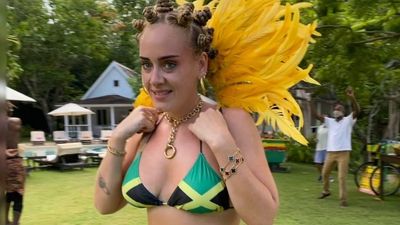Adele's Notting Hill Carnival Costume Sparks Diaspora Debate
The online reaction to Adele's Bantu knots reveal a divide in the African diaspora over cultural appropriation
When Adele posted a photo of herself wearing a Jamaican flag bikini, Bantu knots and Jamaican-themed costume at the Notting Hill carnival last night, the floodgates opened and we were buried in the deluge of criticism and counter-criticism. The English singer-songwriter's Instagram post has once again kick-started a recurring conversation around cultural appropriation, Black outrage and who gets to participate in Black culture or not.
While many, mostly Black Americans and British-Jamaicans have expressed their disapproval of what they say is cultural appropriation, others particularly Black British people of African immigrant descent and Africans themselves, consider the sentiment to be an overreaction and Adele's costume, completely harmless.
From Africans who don't see a reason why Black people are outraged
To those explaining why it is actually important
To those accusing African-Americans of being hypocrites
And a perspective from a Black-British commenter:
Even a member of parliament chimed in:
Some questions come to mind when considering this conversation and what people are essentially saying.
Is it okay to look away because it is Adele and not say, Kim Kardashian or Bhad Bhabie? Who gets to decide on what direction this sort of outrage should take? Africans living in Africa from where the Bantu knots originated from? British-Jamaicans whose heritage was part of Adele's get-up? Or Black-Americans who have had to deal with years of their hair, when worn naturally, being illegal, termed unprofessional, and forced to fit into mostly white beauty/hair standards to be able succeed in viciously white spaces.
While there are various nuances to this conversation, with different parties putting forth their concerns, displeasure and indifference, it is clear that an overwhelming number of Africans haven't come to terms with the many nuances, histories, daily experiences and traumas that come with being Black in America. We might never fully understand.
A disappointing trail that has followed the outrage being expressed by African-Americans is the absolute disregard of their point of view by Africans. An eagerness to term a people's lived experience as "overactive" when we scarcely understand where they are coming from. Until natural Black hair is accorded the respect, dignity, and visibility it deserves when worn on Black people, it doesn't make sense for it to be given a pass when appropriated by white people.
The fact that laws banning the discrimination of Black hair were just being passed last year should tell us all we need to know about the complicated and unjust dynamics of what it means to wear black hair as a black person in America. And this is far as the news tells us. Black people have either been forced to cut their hair before they can be allowed to perform in certain spaces, or have had to straighten it before they are considered professional or appropriate.
This is the backstory many Africans continue to miss, and a reeducation has to happen if we can find ourselves fit to engage in conversations around African-American cultures and experiences, particularly when it comes to hair. We may not have the range, but we don't have to discredit Black people's outrage because our politics with hair isn't as stringent.
- A Nigerian Rap Cover Of Adele's 'Hello' - OkayAfrica ›
- This Swahili Cover of Adele's 'Hello' Is Blowing Up - OkayAfrica ›
- Nigeria Turns 59 and the Internet Goes Nuts About Skepta and Adele ›
- "I Salute It," Michaela Coel Pens Essay Praising Adele For Her ... ›
- This Swahili Cover of Adele's 'Hello' Is Blowing Up ›
- British Fashion House Attempts to Trademark 'Yoruba' - OkayAfrica ›
